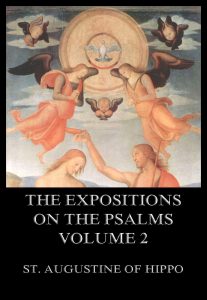The Expositions On The Psalms Volume 2 – St. Augustine of Hippo
In any commentary on a portion of the Old Testament by a writer unacquainted with Hebrew, exact criticism, and freedom from mistake, must not be expected. But the Psalms have been so in the mouth and in the heart of God’s people in all languages, that it has been necessary often to find an explanation suitable to imperfect translations. And no doubt it is intended that we should use such explanations for the purpose of edification, when we are unable to be more accurate, though in proving doctrine it is necessary always to remember and allow for any want of acquaintance with the original, or uncertainty with respect to its actual meaning. However, the main scope and bearing of the text is rarely affected by such points as vary in different translations, and the analogy of the faith is sufficient to prevent a Catholic mind from adopting any error in consequence of a text seeming to bear a heterodox meaning. Perhaps the errors of translation in the existing versions may have led the Fathers to adopt rules of interpretation ranging too far from the simple and literal; but having such translations, they could hardly use them otherwise. Meanwhile St. Augustin will be found to excel in the intense apprehension of those great truths which pervade the whole of Sacred Writ, and in the vivid and powerful exposition of what bears upon them. It is hardly possible to read his practical and forcible applications of Holy Scripture, without feeling those truths by the faith of which we ought to live brought home to the heart in a wonderful manner. His was a mind that strove earnestly to solve the great problems of human life, and after exhausting the resources, and discovering the emptiness, of erroneous systems, found truth and rest at last in Catholic Christianity, in the religion of the Bible as expounded by St. Ambrose. This is volume two out of two, covering the Psalms LXXIV through CL.

The Expositions On The Psalms Volume 2
The Expositions On The Psalms Volume 2.
ISBN: 9783849675974.
Available at amazon.com and other venues.
Biography of St. Augustine of Hippo
Augustine of Hippo (13 November 354 – 28 August 430) was an early Christian theologian and philosopher whose writings influenced the development of Western Christianity and Western philosophy. He was the bishop of Hippo Regius (within modern-day Annaba, Algeria), located in Numidia (Roman province of Africa). Augustine is viewed as one of the most important Church Fathers in Western Christianity for his writings in the Patristic Era. Among his most important works are The City of God and Confessions. According to his contemporary, Jerome, Augustine “established anew the ancient Faith.” In his early years, he was heavily influenced by Manichaeism and afterward by the neo-Platonism of Plotinus. After his baptism and conversion to Christianity in 386, Augustine developed his own approach to philosophy and theology, accommodating a variety of methods and perspectives. Believing that the grace of Christ was indispensable to human freedom, he helped formulate the doctrine of original sin and made seminal contributions to the development of just war theory. When the Western Roman Empire began to disintegrate, Augustine developed the concept of the Church as a spiritual City of God, distinct from the material Earthly City. His thoughts profoundly influenced the medieval worldview. The segment of the Church that adhered to the concept of the Trinity as defined by the Council of Nicaea and the Council of Constantinople closely identified with Augustine’s On the Trinity.
Augustine is recognized as a saint in the Catholic Church, the Eastern Christian Church, and the Anglican Communion and as a preeminent Doctor of the Church. He is also the patron of the Augustinians. His memorial is celebrated on 28 August, the day of his death. Augustine is the patron saint of brewers, printers, theologians, the alleviation of sore eyes, and a number of cities and dioceses. Many Protestants, especially Calvinists and Lutherans, consider him to be one of the theological fathers of the Protestant Reformation due to his teachings on salvation and divine grace. Lutherans, and Martin Luther in particular, have held Augustine in preeminence (after the Bible and St. Paul). Luther himself was a member of the Order of the Augustinian Eremites (1505-1521).
In the East, some of his teachings are disputed and have in the 20th century in particular come under attack by such theologians as John Romanides. But other theologians and figures of the Eastern Orthodox Church have shown significant appropriation of his writings, chiefly Georges Florovsky. The most controversial doctrine surrounding his name is the filioque, which has been rejected by the Orthodox Church. Other disputed teachings include his views on original sin, the doctrine of grace, and predestination. Nevertheless, though considered to be mistaken on some points, he is still considered a saint, and has even had influence on some Eastern Church Fathers, most notably Saint Gregory Palamas. In the Orthodox Church his feast day is celebrated on 28 August. Church scholar and historian Diarmaid MacCulloch writes “his impact on Western Christian thought can hardly be overstated; only his beloved example Paul of Tarsus, has been more influential, and Westerners have generally seen Paul through Augustine’s eyes.”
(The text of the last section was taken from a Wikipedia entry and is available under the the Creative Commons Attribution-ShareAlike License.)
Publisher’s Note: This book is printed and distributed by Createspace a DBA of On-Demand Publishing LLC and is typically not available anywhere else than in stores owned and operated by Amazon or Createspace.
